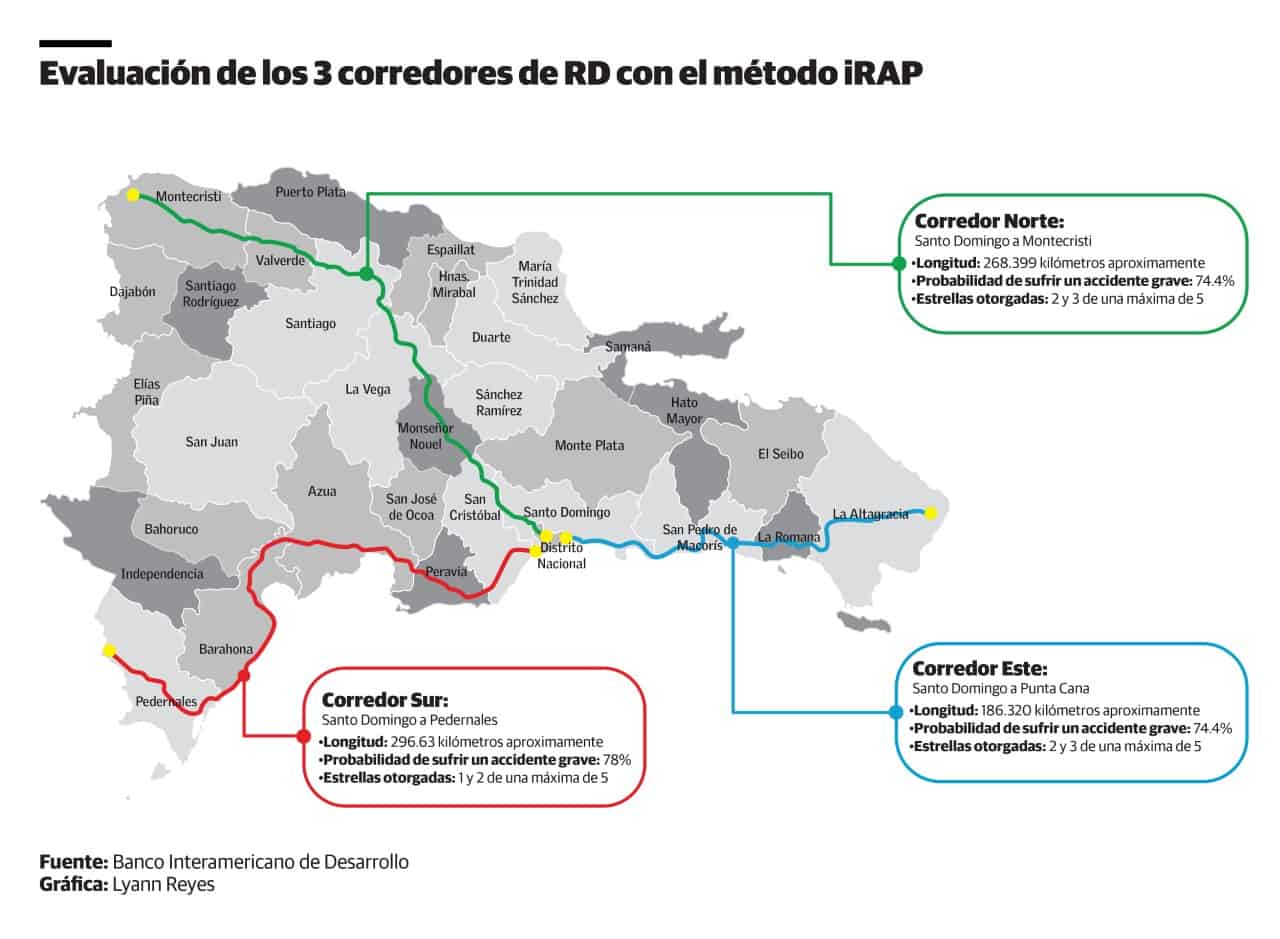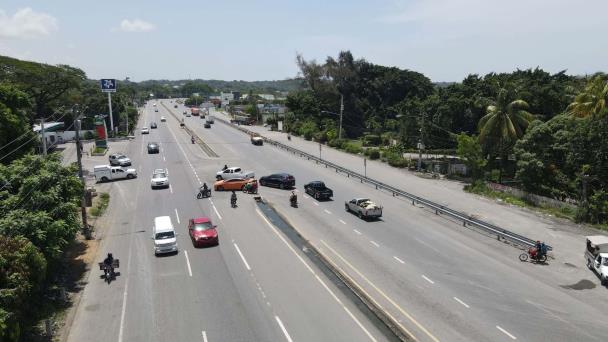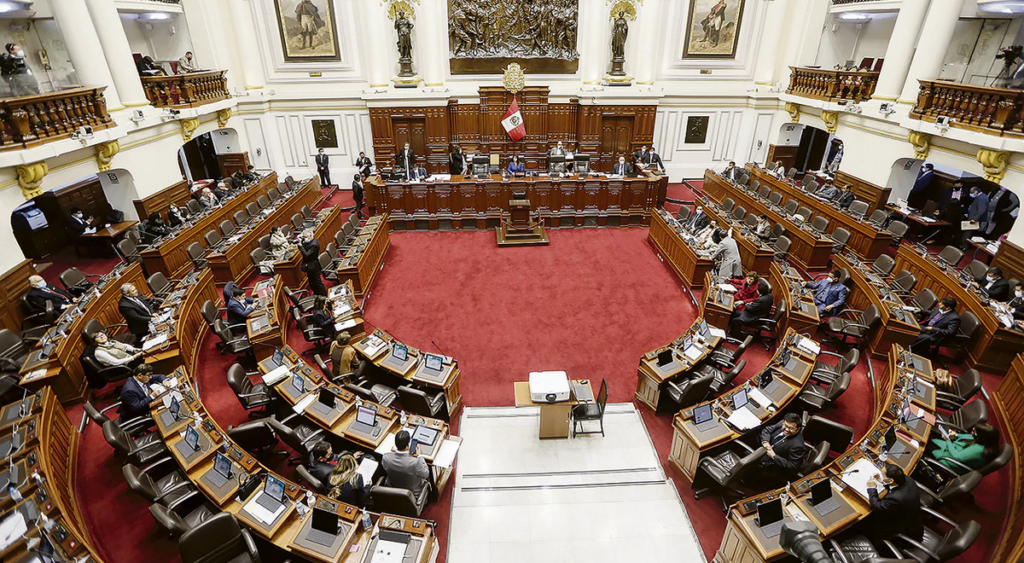A study by the International Highway Assessment Program (iRAP), a road safety evaluator, revealed that the probability of having an accident, with balances of death or serious injury on the three main trunk roads of the country is 78%, in the South Corridor; 74.4% for the Duarte Highway and 40% on the main road in the Eastern region.
The study “Information Gathering for the Evaluation of the Three Road Corridors Under the Methodology iRAP” was carried out in March 2021 by technicians specialized in road assessment, from the International Road Assessment Programme(iRAPfor its acronym in English), the Ministry of Public Works with the support of the Inter-American Development Bank (IDB) and the United Nations (UN).
Among the objectives of the evaluation was to reduce the number of deaths from traffic accidents Y injuries serious, provide an investment strategy to improve road safety and promote a design or investment that allows anticipating the possible errors of users that cause accidents.
To make the diagnosis, a special vehicle equipped with 360-degree cameras and artificial intelligence was used to survey the conditions of the roads every 20 meters in aspects such as speed, lighting, storm drainage, pavement roughness, slopes, signage, railings. , illegal crossings, among others.
Deficiencies were detected in most of these parameters and in some cases total absence. Aspects such as speed, lack of “milling” or improvement of the paving in some sections were identified, signaling inadequate both vertically and horizontally and poorly laid out.
Added to all this are other components, such as reckless driving due to poor driver education, driving under the influence of alcohol or other illegal substances, lack of reducers near schools and other places where many people go, lack of pedestrian and motorcycle bridges. .

The Duarte Highway from the National District to Montecristi, a region where 60% of the country’s total population lives in 14 provinces, was taken as a pilot. In that route alone, 1,132 illegal occupations were identified on the road and 161 illegal crossings where the largest number of accidents occurs.
The project contemplated a journey of 751.37 kilometers in the outward direction that covered 15 of the 31 provinces. From Santo Domingo to Pedernales, which is approximately 296.63 kilometers; Santo Domingo to Montecristi, 268.39 kilometers and from Santo Domingo to Punta Cana, approximately 186.32 kilometers and as a result of the investigation the roads are rated by stars from 1 to 5 stars. Neither way reaches 4 or 5.
In the Southern Corridor, 28 sections with 9 roadways were studied for a total of 344.87 kilometers; In the case of the North, 51 sections were analyzed and diagnosed divided into two stages: Navarrete Montecristi 28 sections and Santo Domingo Navarrete 23 sections with 23 roadways, while the East was divided into 12 sections, all defined by national regulations between cities, major intersections or section changes.
The qualification granted by the experts of the iRAP It was 1 and 2 stars for the North Corridor; 1 and 2 stars for the South road, as well as 2 and 3 stars for the East road. The authorities carry out improvement projects so that the country has at least three stars according to the parameters of the iRAP.
some statistics
Information collected from 2016 to 2019 shows the number of deaths from traffic accidents in the three corridors studied.
On the southern highway, 371 people died in traffic accidents In those three years, north corridor 1007 and for the East, the figure was 410 deaths, in the same period. The World Health Organization (WHO) for the year 2018 estimated at 34.6 the deaths in traffic accidents for every 100,000 inhabitants.
“The data is revealing, worrying. The iRAP what it does is that it gives you a category per section that qualifies and classifies the road between one and five stars. When all this information indicating the number of stars, the level of safety and the probability of suffering a traffic accident was processed, we realized that the problem was very serious”, explained the engineer. Oneximo GonzalezGeneral Advisor to the Minister of Public Works, Delign Ascensionand one of the project managers.
González, who was director general of the former Metropolitan Transportation Authority (AMET) from 2000 to 2002, said that during a period of six months, international experts and specialists in highway safety programs, stationed in the United States, Europe and America, they studied the corridors and determined the high level of danger of the main road networks in the country.
“We have achieved that the Government of the President of the Republic, Louis Abinader, keep the safety of our highways on your country’s agenda, as an issue of high importance,” he said. It was for this reason that the president appointed the minister of Public Works, Delign Ascension as head of the delegation to represent the country before the High-Level Meeting of the United Nations General Assembly on Global Road Safety, held earlier this month at the organization’s headquarters. Through the official and the entourage that accompanied him, the Government promised to continue working “enthusiastically” to meet the goal of reducing deaths by 50% by traffic accidents looking ahead to the year 2030.
Numbers and deaths
The Dominican Republic ranked fifth in the world in deaths from traffic accidents and the second in the region of the Americas, but according to data from the World Health Organization (WHO) it now ranks first in the world with 64.6 deaths per year per 100,000 inhabitants.
In accordance with Oneximo Gonzalezsupported by the data provided by the WHO and national research, between 3,400 and 4,000 people die each year on the country’s streets, highways, highways, and local roads, most of them are people between the ages of 15 and 29 and, in addition in mourning, they leave economic losses estimated at three billion dollars, equivalent to 2.5% of the Gross Domestic Product (GDP).
The largest number of victims are motorcyclists, of the 5,152,448 vehicle units registered by the General Directorate of Internal Taxes (DGII), 2,874,590 are motorcycles for 55.8% of the vehicle fleet.
The provinces where the greatest amount of traffic accidents with balance of deaths or injuries permanent are: Santo Domingo, San Cristóbal, Santiago, La Vega, Azua, La Altagracia, Peravia, Puerto Plata, Monte Plata and the National District.
What is done
Based on the results of the investigation of the iRAP and by precise instructions of the president Louis Abinaderthe Government intends to reduce, at least by half, the number of deaths due to traffic accidents in the country.
The intervention of the roads was declared of “high necessity”, starting with the North Corridorfrom kilometer 9 of the Duarte Highway to Montecristi.
From La Vega to Santiago, 42 crossings have already been closed and others are being worked on. From the heart city to Navarrete, the road will be fully paved with the support of the General Directorate of Traffic Safety and Land Transportation (Digesett) and the Military and Police Commission. of the Ministry of Public Works (Comipol).
“Navarrete-Montecristi is an intervention project of about 44 million dollars that will be financed by the IDB as part of the financing of the port of Manzanillo”, said González.
The project North Corridor It implies the total reconstruction of the Duarte Highway from kilometer 9 to Santiago. From 9 to kilometer 28 of the Duarte, a coordinated plan is being executed with the Intrant with financing of 20 million dollars that contemplates improving road safety in school environments.
In the case of the southern highways, the 6 de Noviembre and the Sánchez highways, illegal accesses have been closed and with the support of the Inter-American Development Bank (IDB) a plan of concrete actions will be made to install the pedestrian and motorized crossings that are needed.
The UN supports a plan with a donation of 360,000 dollars in training of professionals in universities so that engineers become “road safety auditors”, specialized in the application of technology with programs such as the iRAP.
For the East, the works are completed from the toll of Las Américas to Boca Chica, the most dangerous section, according to González.
Investment plan
To make trunk roads safer and achieve at least 3 stars through the mechanism iRAP Based on the action pillars of institutionality, infrastructure, safer vehicles, safer road users and responses after accidents, an investment plan is required.
For interventions in South Corridor the results of the analysis of the iRAP show that the investment required is RD$2,018,000,000 in security treatment that would prevent 26,268 deaths and deaths in 20 years. injuries serious and the economic benefit for the country would be around RD$9,177,000.
In the case of North Corridor would be RD$18,251,000,000 and in the same period it would prevent 79,920 deaths and injuries serious, which economically would represent a benefit worth RD$237,340,000,000.
For the East Corridor, the investment is around RD$2,958,000,000 in security treatment that would prevent 27,655 deaths in 20 years and injuries serious that economically have an estimated value of RD$82,127.















